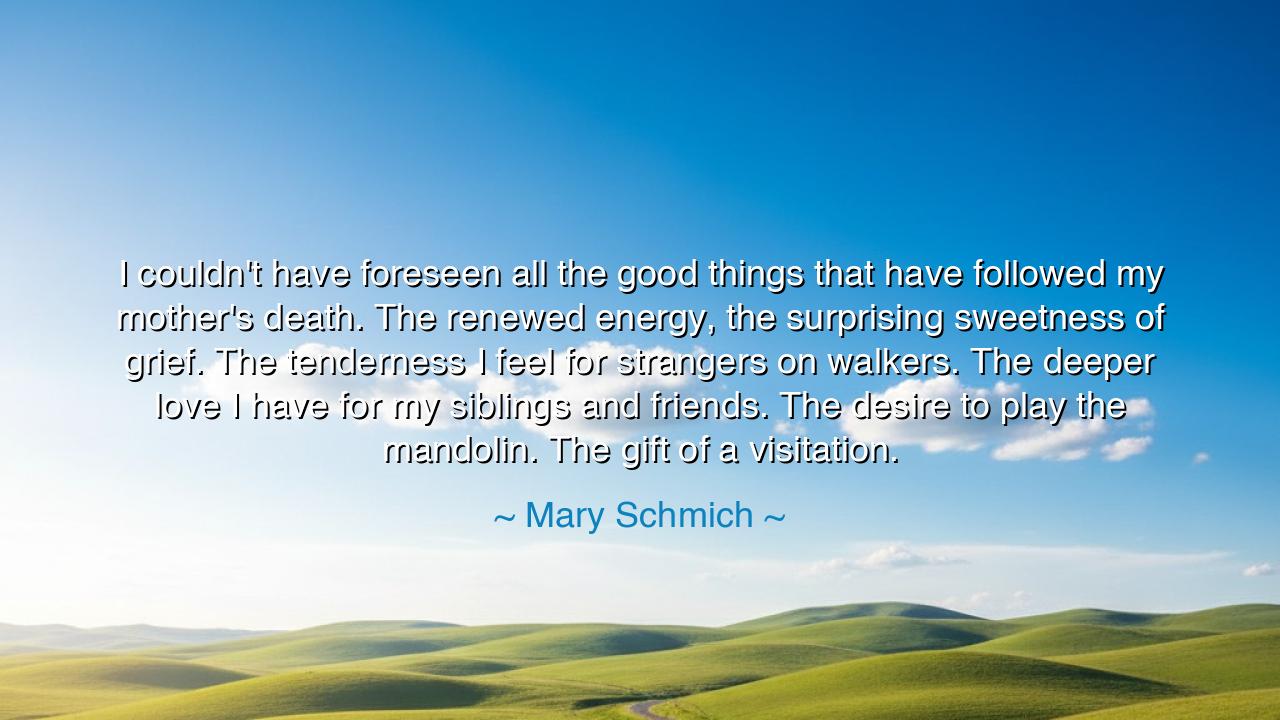
I couldn't have foreseen all the good things that have followed
I couldn't have foreseen all the good things that have followed my mother's death. The renewed energy, the surprising sweetness of grief. The tenderness I feel for strangers on walkers. The deeper love I have for my siblings and friends. The desire to play the mandolin. The gift of a visitation.






The writer Mary Schmich once reflected, “I couldn't have foreseen all the good things that have followed my mother's death. The renewed energy, the surprising sweetness of grief. The tenderness I feel for strangers on walkers. The deeper love I have for my siblings and friends. The desire to play the mandolin. The gift of a visitation.”
These words are as soft as mourning and as radiant as dawn — a testimony to the mysterious alchemy of loss and renewal. They speak to that sacred paradox which the ancients knew well: that from the deepest sorrows often rise the purest joys, that even death, which seems the final silence, can become the teacher of life. Schmich’s confession is not a denial of pain, but an awakening to what pain can reveal — that grief, when embraced with openness, can transform the heart, not break it.
The origin of this quote lies in the tender reflections of Schmich after the passing of her mother, an experience that altered her understanding of love, mortality, and connection. As a journalist and observer of life’s small miracles, she found that death, which she had feared as emptiness, instead became a source of unexpected abundance. In her words we see the transformation of despair into gratitude, of absence into presence. Where she might have expected only sorrow, she found sweetness — a sweetness born from remembrance, compassion, and the realization that love does not end with death, but changes form.
When she speaks of “the surprising sweetness of grief,” she touches upon one of life’s most profound mysteries. The ancients, too, understood this — that grief, fully lived, refines the soul. Kahlil Gibran, the poet of Lebanon, once wrote, “The deeper that sorrow carves into your being, the more joy you can contain.” It is through pain that the heart is hollowed, making space for compassion. Schmich’s tenderness toward “strangers on walkers” is not coincidence — it is the fruit of her own loss. Having walked through the valley of mourning, she can now recognize that same valley in others. Her pain has become a bridge to the world, turning isolation into empathy.
History offers many mirrors to her experience. Consider the story of Queen Victoria, who, after losing her beloved Prince Albert, withdrew into mourning — but from that solitude came a transformation of her reign. Her grief deepened her understanding of her people, and her compassion became her strength. Through the lens of suffering, she saw the fragility and dignity of all lives. Like Schmich, she discovered that grief, when not resisted, becomes a form of love — not an end, but a widening. For grief is the echo of love that refuses to die, and when it is accepted, it matures into wisdom.
Schmich’s words about “renewed energy” and “the desire to play the mandolin” reveal yet another truth: that death can awaken the living. When one we love passes, something in us — long dormant — stirs. We become aware of the brevity of existence, and the preciousness of joy. Life, once ordinary, becomes sacred in its fragility. To pick up an instrument, to sing, to walk, to touch — these acts become offerings of remembrance, ways of saying: because you lived, I will live more deeply. In this way, the dead do not fade; they become the wind that fills our sails, urging us forward.
And when she speaks of “the gift of a visitation,” Schmich acknowledges the mystery that grief sometimes brings — the quiet sense that those we love are not gone, but near. Whether in memory, in dream, or in the tender coincidences of daily life, we feel their presence — not as ghosts, but as companions in spirit. The ancients called this communion with the ancestors: a belief that the departed continue to guide the living through unseen ways. In this light, the veil between life and death is not a wall, but a window.
So, my child of love and loss, learn from Mary Schmich’s wisdom: do not fear grief, but walk through it with open eyes. When the ones you love depart, let their absence teach you tenderness, not bitterness. Let it draw you closer to others who suffer, for in their eyes you will see your own reflection. Honor your dead not by clinging to sorrow, but by living with greater depth, kindness, and creativity. Play your mandolin — whatever form it takes in your life — and let its song carry the memory of those you have lost.
For the final truth is this: grief is love transformed. It is the seed that, when watered by tears, grows into empathy, joy, and meaning. Schmich’s revelation — the “sweetness of grief” — is not a denial of pain, but a testament to its sacred purpose. The heart that has broken open does not close again; it becomes a vessel wide enough to hold the world. And when you, too, stand at the crossroads of loss, remember her words: the end of one life can be the beginning of many blessings — if only you dare to let sorrow teach you how to love more deeply than before.






AAdministratorAdministrator
Welcome, honored guests. Please leave a comment, we will respond soon